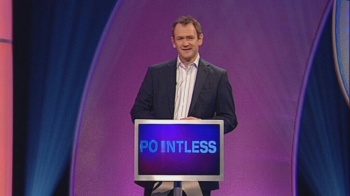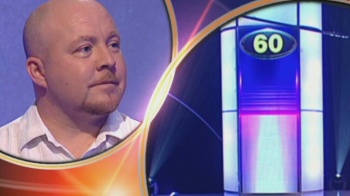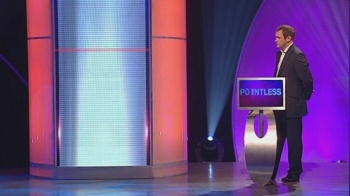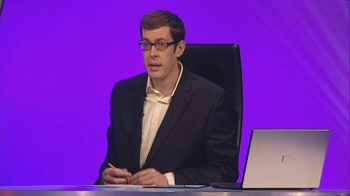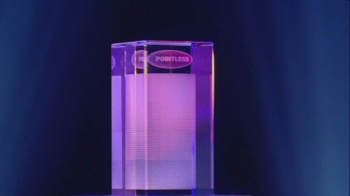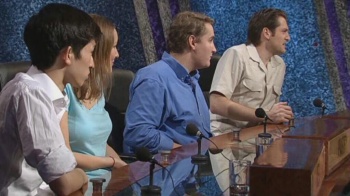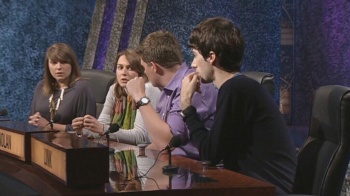Weaver's Week 2009-09-20
Last week | Weaver's Week Index | Next week
Contents |
Pointless
Brighter Pictures (another Endemol company) for BBC2, 4.28 weekdays
| Time to spin the Format Tombola, which this week is giving a basic idea of "answers in a category", set in "a studio", hosted by the entirely interchangeable "Alexander Armstrong", and with a defining twist of "popularity is bad". So, the new The Colour of Money? Er, no. It's better than that.
Lesser reviewers will see the title of the show, and make the comment that it is entirely without an objective. It lacks a narrative climax. There is no reason for its being. Et cetera, et cetera, ad norvegica. Being slightly better than these lesser reviewers, we're going to review the show properly, without preconceptions. The title sequence contains a lot of unnecessary movement, flying past arbitrary numbers ranging from one to one hundred. Are we suddenly watching Een Tegen Een Hondred? Again, no. We're watching a show hosted by Alexander Armstrong, not the entirely interchangeable Dutch host Martin van Groot. There are five couples playing, and Armstrong gives a brief introduction to the players before getting on with the show. | |
| Now, before the show, the Pointless researchers asked one hundred people a series of questions. They were given one hundred seconds to give some responses to each question. Each question had many possible answers – "European capital cities" is the example we're going to run with. Each answer is awarded as many points as people who gave that response, so "London" scores 98, because 98 people gave that response. More obscure answers like "Vilnius" scores 26. But if one of the contestants were to give "Podgorica" as their answer, they would score precisely nothing, because none of the surveyed people could remember the capital of Montenegro. Each of these "pointless" answers scores no points (hence the name, these answers are sans points), and adds £250 to the daily jackpot.
In round one, the host gives a broad category, and the couples decide who shall play first, and who shall play second. The couples have drawn lots before the show began to determine the order of play, and it begins on the right and works left. The other member of the couple then steps up to the podium – they're not allowed to confer in this round – and play returns from left to right. The team with the highest score is eliminated. | |
| During this round, ten answers are given, and each time, we see a diminishing stack of silver disks, representing people who gave each correct answer. And there's a taped insert of the crowd going "ooooooooh" as the silver falls away, the red surrounding turns blue, and some plinky-plinky-plinky noise as it goes. On the return leg, there's a red line on the display, below which the players are safe.
And, er, that's about it. We'll repeat the round three times, resetting the scores to nil, and reduce to two teams, and this will take almost exactly half-an-hour. It's only about one answer per minute. Some of the time is taken up with discussion with Richard Osman, the show's resident boffin who knows all the answers, explains the questions, and generally ensures fair play. But most of the show is taken up with the responses: twenty-four answers to three questions in 30 minutes isn't going to set any records for speed. The last two couples take part in a head-to-head final. Here, the couples will give answers in turn, and will be allowed to confer. The team that goes over 100 points first loses; if both sides are over 100 following an equal number of responses, the lower score progresses. Again, this runs at about one response per minute, and the red line is in position from the second run of responses. | |
| Now, there is some scope for tactics here, as the side doing best in the opening rounds is allowed to pick one of two categories, and is allowed to choose whether to answer first or second. We cannot see any reason why the side should choose to go second, or should not play to their preferred subject. And, of course, an incorrect answer will surely mean instant elimination.
For the final, the remaining couple is given three potential categories, and selects one of them. The question is revealed and explained, before the couple is given a minute to discuss the various possibilities. On one show we watched, they were asked to name some Girls Aloud singles, a difficult task in any event. We thought there were only three: the fast one, the slow one, and the theme from Blankety Blank. Does that win the team some prizes? Well yes, they win the Pointless Trophy, an object that is a legend in its own lunchbox. But to win cash, the team has to provide three answers, of which at least one needs to be unknown to every other respondent. "Wake me up" was completely beyond everyone answering the questions, including a Mrs. Cole of West Ham. It's this sort of arcane knowledge that won the players £5000. More often than not, the prize is left unwon, and rolls over to the next day, with an additional £1000 put in the kitty. |
|
| And, er, that's about it. Forty-five minutes, and there's only about one winner per week. In fairness, contestants who lose in the earlier rounds (but not the final) are allowed back for a second shot, thus reducing the turnover of players a little, but not bringing them back enough to build up familiarity.
We found the show to be entirely decent at heart, but it feels like a 30-minute programme stretched out into a 45-minute slot. It drags terribly. There's no sense of urgency, no tremendous tension. For instance, every time a question is answered, there's the opportunity for some extra tension: is it an accurate answer, because if it's not, the couple will score 100 points and face almost-certain elimination. Rather than build up the tension by asking, "Is the answer valid," and waiting for a tick or a cross, the stack just diminishes straight away, or displays the cross of doom. At least let Alexander ask if that's a correct answer, build in a little extra surprise. Alexander Armstrong doesn't get to use his talents on the show, it's a limiting format, and he's an adequate but not inspiring host. Would Richard Osman be able to host the show from his corner of the studio? It might work, it might be worth a try. Our thoughts to improve the show? It begs to be reduced to 30 minutes, and perhaps to four couples, or to have scores carry forward through the first rounds. We might also give some money to the winning team (for instance, £500 but reducing by £2 for each point scored by their responses), but the show would work without that. In short: we like the concept, but it's drawn out too long and needs some work. There is a point to Pointless, perhaps as a piece of Saturday teatime filler currently occupied by Celebrity Weakest Link. |
The Round Britain Quiz question, set on Thursday. "In reverse order: the voice of Parklife, Mr. Hopwood, the Midnight Special, the student Abi, Britain's worst driver, and the MP for La Trobe. The list is complete now, but when we give the answer, another will be added. Why?" The answer – and the new element – will be served up before the end.
University Challenge
Heat 10: St John's Oxford v Durham
| We'll kick off with Word of the Week, it's "assay", as in the assurance that it's proper precious metal. It's correctly answered by St John's Oxford, the college with a cannonball in the door from the Civil War. Thumper doesn't mention any former students, so let's name three. Rob "Rob" Linham, one quarter of the reigning UC The Professionals champions; Aaron "Superperson" Bell, the most recent Krypton Factor champion; and Victoria "Teacup" Coren, host of the best game show on British television according to the UKGameshows.com readership, and they're always scoring Ten points! on the wall.
So no pressure to live up to these masters of quiz, then. St John's get the first three starters, allowing Durham in on the fourth question. The university was founded in 1832, taking over the city castle, and we're told of a superstition that students shouldn't go up the cathedral tower lest they fail to secure a First. A similar superstition about not walking on the grass is cited to groundsmen wanting an easier job. Durham's alumni are also not stated, and include UKGameshows.com site editor David "J" Bodycombe. Durham aren't so good on their statistics, and the first visual round – on television detectives – puts St John's ahead by 70-5. | |
| Geekery of the Weekery is "cloud computing", and the resultant set of bonuses is on Monty Python. A subsequent answer of "insect" is rewarded with bonuses on butterflies, almost as if this bit was planned. It's only ten minutes since the credits began – seven minutes into the game proper – but every member of the St John's team has already answered at least one starter correctly. And they keep on coming: this is as dominant a performance as that of Imperial College last week, and Durham's traditional place in the quarter-final looks under threat. The audio round is on Savoy comic operas, and St John's has extended its lead to 185-5.
Sorry, Durham, we're going to write "Game over" in our notebook. It's the cue for Charles Darwin to be a correct answer, and treble the side's score. It's as good as it gets: the Buddha and questions on Samoa put the Oxford side ahead by two hundred points, and even a suggestion that "Middlemarch" was written in the twentieth century is met with only a little snark. The second visual round is on modern sculptors, and St John's lead is 235-45. Mastermind-baiting answer of the week links the "Hallelujah" chorus with the 'National' Idol song. What's "so like the mathematik it can never be learned"? Angling, obviously, it's the only think Isaac Walton is remembered for. Durham begins something of a comeback in the closing minutes, though that's not so difficult when they've hardly troubled the scorers in the opening minutes. At the gong, St John's has won by 270-90. | |
| It's actually not that Durham was particularly bad: they went 7/17 on bonus questions with one missignal, and seemed to get unusually tricky questions. We suspect they might well have come out on top against some of the winners we saw during August. They just came across a side who were really good on the buzzers. James Link was top of the buzz for Durham, getting three starters; David Townsend led for St John's with six. St John's ended on 25/45 for their bonuses, and had the one missignal.
Next match: Magdalene Cambridge v St Hugh's Oxford | Repechage standings:
|
Mastermind
Heat 4
Maud Robinson begins this week's show, talking about Oscar Wilde. Actually, that's not strictly true: young Mr. Humphrys begins the show, talking about the chair not being all that comfortable. The first question is about Wilde having "nothing to declare except his genius", and after a very good start, the contender slips into a pass spiral towards the end of her round, ending on 8 (6). A shame.
Gavin McEwan has one of the broadest subjects we've ever seen: the Germanic Languages. All of 'em. English, German, Dutch, Danish, the works. Including lowland Scots, as the first answer reminds us. We could go on listing Germanic languages, but this is not Pointless and we don't want to put the entire Mastermind budget in the prize fund. It's a far from pointless round, 14 (0) and we're very impressed.
Mike Wilkin offers the History of Jazz Music 1917-30. This is generally held to be Early Jazz, and Mr. Wilkin says in his PSC that he's deliberately asking people to go back and listen to the music of the era. (PSC? Portable Single Camera, the device that records the inserts against the white background.) The names are familiar to us, but the answers are not. It's Mr. Wilkin's subject, and he scores 13 (0).
Finally, Vishal Dalal, taking the Life and Films of Akira Kurosawa. We're told that this gentleman was a leading Japanese film director who influenced many other film-makers, including the Star Wars flicks. The contender goes through the questions at a great clip, finishing on 16 (0).
Maud Robinson is given some nasty questions, the worst of which invites her to remember an Andrew Lloyd Webber musical. Any question involving that man is an evil question. There's also a whole limerick read out: that's 34 syllables plus 16 to set up the question. Too long! The round ends on 14 (10).
Mike Wilkin spends forever trying – and failing – to derive "cockroach" from the Spanish name "cucuracha". It's a question of confidence, and it does seem to sap the contender's faith a little. He still makes a good fist of it, ending on 20 (3).
Gavin McEwan begins with a question about caviar. Quite why fish eggs are treated as a delicacy is entirely beyond us. He gets the BBC cross-promotion question, plugging Jocelyn Stone's appearance on The Tudors, and finishes on a very respectable 26 (4). Second on the repechage board at the very least.
Vishal Dalal begins with a couple of easy questions, but he seems to be by far the youngest contestant of the night, and we have a suspicion that young contestants really struggle in the general knowledge round. Still, where he can guess, he's guessing, and that's the right tactic. The round feels like it's not going to win, and ends on 23 (4). It's not going to bring him back in the repechage, surely.
This Week And Next
A very quick follow-up to last week's review of The Cube. We almost liked it. If the dominant colours were black and white, or blue and white, or any colour combination other than red and white, we almost certainly would have liked it. This is a shame, and we're probably missing something good.
The European Broadcasting Union has said how utterly depressed they are at Azerbaijani police intimidating the 40 or so people who voted for Armenia at this year's Eurovision Song Contest. It's only a game show, fer cryin' out loud. They've now said that they'll exclude any broadcaster where the national telecoms company discloses information that could be used to identify voters.
The UK's politicians clearly haven't got enough to do, because they're arguing about when Strictly Come Dancing and Simon Cowell Annoys should go out. Last night's utterly live transmission of Strictly (7.25 to 9.05) neatly overlapped with the entirely-recorded Cowell promo show (8pm to 9.15). There's nothing new about this: the shows have traditionally overlapped to some extent, and with Strictly giving its results on the night, they're entitled to a longer show. No, this strikes us as a piece of panic by ITV, who are worried that they won't be able to deliver the promised audience to Simon Cowell, and have moved his promotional series from 7pm so that it clashes by an extra quarter-hour. If ITV really cared for its audience, as it claims, it wouldn't make so many tedious soaps or inflict For the Rest of Your Life on an insomniac audience. As for the politicians: please respect other people's expertise, and allow television schedulers to do their job while you do yours. Not that the television schedulers couldn't do it better...
Spinning back to the original tangent, the RBQ answer: it's all to do with Strictly Come Dancing, and in particular the first people voted off each year. From last year and working backwards, they were: Phil Daniels (who performed the vocal on Blur's single Parklife); Brian Capron (Mr. Hopwood on Grange Hill); Nicholas Owen (host of Channel 4 News Midnight Special programmes during the 1991 war); Siobhan Hayes (Abi on My Family); Quentin Willson (creator of the Britain's Worst Driver series); and Jason Wood, who shares his name with the MP for La Trobe in Australia. When we posed the question on Thursday, the list was complete; since then, Martina Hingis has been voted off the show.
Ratings for the week to 6 September are in. Simon Cowell Annoys 12.85m people this week, a season's best. The Cube had 5.25m viewers, and Dragons' Den 4.05m. BBC1's best show was Would I Lie to You, a year's best 3.7m on bank holiday Monday. Big Brother finished with 3.25m seeing whoever it was win. Mock the Week had its best performances of the year (3.05m for the main show, 2m for the repeat), and 2.7m saw Dragons' Den On Tour.
ITV2's More Annoyance show had its best result of the still-young season, 1.73m; the narrative repeat had 1.185m on Sunday. Come Dine With Me recorded 1.29m on Sunday, and Big Brother's Big Mouth finished with 590,000 viewers. The Only Connect grand final was seen by 265,000 viewers on Monday, and Dragons' Den had its best performance on BBC-HD, 165,000 tuning in there. New shows included Strictly Ice Dancing (110,000 on UKTV Watch), The Sack Race (30,000 on UKTV ORLY), and Art Race (18,000 on Artsworld or whatever they're calling it this week).
The coming week sees a new series of Celebrity Family Fortunes, starring people who aren't even families (ITV, 7pm Sunday), and Celebrity Come Dine With Me (C4, 8pm Sunday). Strictly Come Dancing It Takes Two returns (BBC2, 6.30 weekdays), and Irish viewers get to see The Apprentice (TV3, 9pm Monday) and Glor Tire (TG4, 8pm Saturday). Everyone can enjoy Poetry Slam (Radio 4, 11pm Thursday) and miss Golden Balls (Challenge, 9pm weekdays). If none of that's to your taste, bring on the wall! (BBC1, 6.10 Saturday)
To have Weaver's Week emailed to you on publication day, receive our exclusive TV roundup of the game shows in the week ahead, and chat to other ukgameshows.com readers sign up to our Yahoo! Group.

